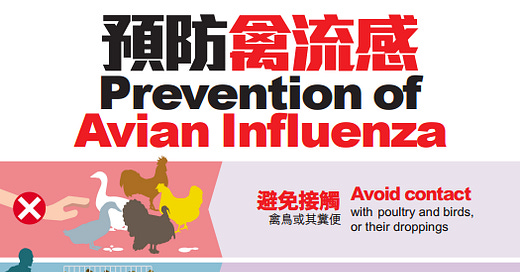In a follow-up on a report earlier this week, the Hong Kong Centre for Health Protection (CHP) of the Department of Health (DH) reported today that the human case of influenza A (H9) infection detected in a 22-month-old girl has been confirmed as H9N2 avian influenza.
"According to the whole genome sequencing result, it is believed that the H9N2 virus isolated from sample of the patient are of avian origin. The relevant avian influenza virus showed no re-assortment with genes of human influenza origin. The CHP also found that the relevant H9N2 virus is sensitive to antiviral medicine Tamiflu." a spokesman for the CHP said.
The symptoms of the patient had subsided and is still undergoing isolation at Princess Margaret Hospital. She is now in stable condition.
The patient recently visited Zhongshan (Guangdong province, China) and had no history of recent direct contact with poultry, consumption of undercooked poultry meat or contact with patients.
Novel influenza A infection, including influenza A (H9), is a notifiable infectious disease in Hong Kong. Influenza A (H9N2) infection is a mild form of avian influenza. Nine cases of influenza A (H9N2) had been reported since 1999. The recent case was an imported case reported in 2020. No deaths have been recorded so far.
As of 22 February 2024, and since 1998, a total of 130 laboratory-confirmed cases of human infection with avian influenza A(H9N2) viruses and one additional case with A(H9) in China, including two deaths, have been reported in eight countries, majority in China.
Most of the cases were children with mild disease.





